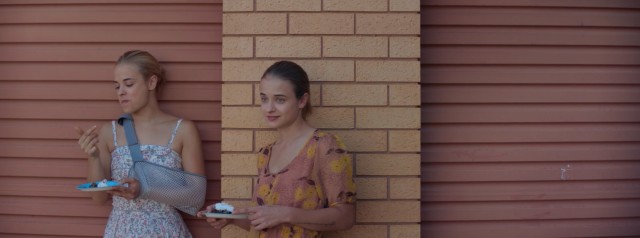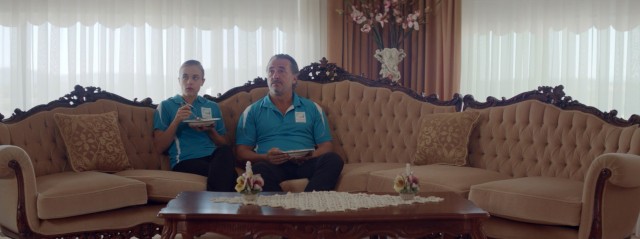Anyone with twins in their family, or social circle, will probably already know about the very special connection they often share. A bond deeper than most us could understand, the potential for fierce rivalry is always lurking beneath the surface, with an intensity you wouldn’t find with your worst frenemy. These dynamics can be further elevated by parents who mean well, yet project their own aspirations, hopes and dreams onto their children, with questionable results. Alyssa McClelland’s Second Best depicts all of these aspects in a laconic dark comedy about adolescent identical twins Nouchka and Velika, and their Russian immigrant parents.
“I’m passionate about the darker comedy that thrives amongst the everyday”
While Nouchka is training hard, as a rhythmic gymnast under the rigorous guidance of her overbearing mother, her sister Velika has left her past as a gymnast behind to work in a local spa store with her taciturn father. The attentional focus of their ambitious mother, who’s own self-worth stems from the accomplishments of her daughters, is made clear, as is the dichotomy in the sister’s respective lifestyles – until one fateful day, both of their careers take an unexpected turn.

McClelland admits she wanted to explore “the complex and unmatchable twin connection” in Second Best.
Second Best draws its peculiar humor from the brilliantly constrained performances of its entire cast and the perceptive script, co-written by Simone Moessinger. “I’m passionate about the darker comedy that thrives amongst the everyday and strays just an inch from reality”, writer/director McClelland explains to S/W as we discuss the aspirations of her short.
Convinced that “familial love is the perfect thematic foundation for this type of comedy to thrive”, the filmmaker was keen to point out the personal decision behind picking this particular family dynamic. “My mother was a fraternal twin incredibly close to her sister – this film is dedicated to her – my best friend throughout high school was an identical twin and I dated an identical twin for 5 years. Needless to say I have a thing for twins. I had long wanted to make a darkly comedic film that delved into their shared stories and explores the complex and unmatchable twin connection.“
Despite the dry comedic tone of Second Best, McClelland takes her characters seriously, treating them like fully-fledged human beings, even though some of them display very odd characteristics. When we shake our head at the ridiculousness of the “hot-shot“ employee-of-the-month, his disproportionate arrogance is laughable to us as an audience, but we can also empathize with Velika and her co-worker Matt in their dislike of their preposterous colleague.

The director says it was “wonderful” to shoot in the 2.66:1 ratio, citing a desire to “let scenes play out in the wide, with characters coming and going”.
Shot in a 2.66:1 aspect ration, the wide frame of the film emphasizes how the characters seem to be lost in the mundane absurdity of their surroundings – the shot of Velika and her father eating together in the middle of their living room couch, a prime example. The sterile emptiness of the salesroom setting reflects the bored hollowness of Velika’s own daily routine, stuck in a job that she seems to endure with defeated stoicism. While the bleak gymnasium in which Nouchka competes has a depressing veneer about it that feels like it is intended to slowly suck the enthusiasm and spirit out of promising young people.
It’s particularly remarkable how Second Best uses dialogue sparsely and trusts in the restrained physicality of the actors, along with a confident use of silence and some prudent sound design and music, to tell its story. As with most families, the film knows that even though some things are never clearly articulated, the subtext is discernible between the lines of each interaction and in what is left unsaid.

 Georg Csarmann
Georg Csarmann